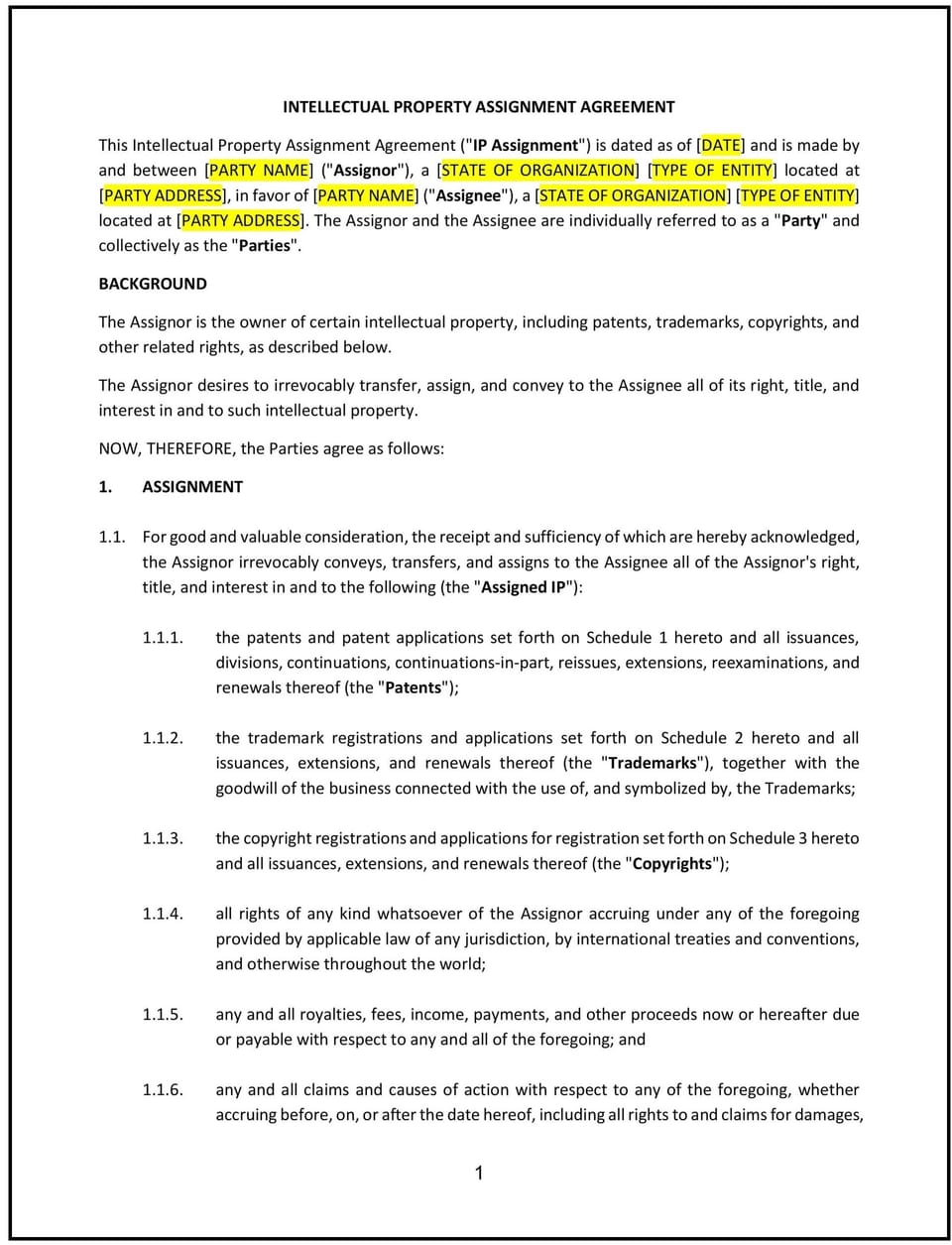Intellectual Property Assignment Agreement (North Carolina): Free template

Intellectual Property Assignment Agreement (North Carolina)
An Intellectual Property Assignment Agreement is a legal document that transfers ownership of intellectual property (IP) rights from one party (the Assignor) to another (the Assignee). In North Carolina, these agreements are governed by state contract laws and must align with federal intellectual property statutes. It is crucial for businesses and individuals to clearly outline the scope of the assignment, ensure proper consideration, and meet North Carolina’s legal standards.
For example, a Charlotte-based software company might assign its mobile app design to a Raleigh-based tech firm as part of a partnership agreement. A well-drafted Intellectual Property Assignment Agreement clarifies ownership transfer, timelines, and adherence to North Carolina’s requirements.
Tips for drafting and maintaining an Intellectual Property Assignment Agreement in North Carolina
- Identify the parties involved: Clearly specify the names, addresses, and roles of the Assignor (current owner) and Assignee (new owner) of the intellectual property.
- Example: “The Assignor, [Name/Company], located at [Address], hereby assigns all rights, title, and interest in the intellectual property to the Assignee, [Name/Company], located at [Address].”
- Define the intellectual property being assigned: Provide a detailed description of the IP being transferred, including patents, trademarks, copyrights, trade secrets, or any other relevant assets.
- Example: “The intellectual property includes U.S. Trademark Registration No. 9876543, titled ‘BrandX Logo,’ along with all associated marketing materials and derivatives.”
- Specify the consideration: Outline the payment or other compensation provided in exchange for the assignment of IP rights.
- Example: “In consideration for the assignment, the Assignee agrees to pay the Assignor $100,000 within 30 days of the execution of this agreement.”
- Include warranties and representations: The Assignor should warrant that they own the IP, have the right to assign it, and that it is free from encumbrances or claims by third parties.
- Example: “The Assignor represents and warrants that they are the sole owner of the intellectual property and that it is not subject to any liens, claims, or disputes.”
- Clarify future use restrictions: Specify whether the Assignor retains any rights to use the IP after the transfer or if the assignment is exclusive.
- Example: “Upon execution of this agreement, the Assignor shall have no further rights to use, modify, or distribute the intellectual property.”
- Set confidentiality obligations: Protect sensitive information shared during the assignment process with a confidentiality clause that aligns with North Carolina’s trade secret laws.
- Example: “Both parties agree to maintain the confidentiality of all proprietary information disclosed during the term of this agreement and for five years thereafter.”
- Outline governing law and jurisdiction: Ensure the agreement specifies that it is governed by North Carolina law and identifies the appropriate courts for dispute resolution.
- Example: “This agreement is governed by the laws of the State of North Carolina. Any disputes arising under this agreement shall be resolved in the courts of [County], North Carolina.”
- Include signatures and notarization: Both parties must sign the agreement, and notarization may be required for certain types of intellectual property, such as patents.
- Example: “IN WITNESS WHEREOF, the parties have executed this Intellectual Property Assignment Agreement as of the date first written above.”
Frequently asked questions (FAQs)
Q: What legal requirements must an Intellectual Property Assignment Agreement meet in North Carolina?
A: The agreement must comply with North Carolina contract laws, clearly identify the parties and intellectual property, include consideration, and be signed by both parties.
Q: What happens if the intellectual property described in the agreement is unclear?
A: Ambiguities in the description of the intellectual property can lead to disputes or render the agreement unenforceable. It’s essential to provide precise details about the IP being transferred.
Q: Can an Intellectual Property Assignment Agreement be modified after signing in North Carolina?
A: Yes, but modifications require mutual consent and should be documented in writing to avoid future disputes.
Q: What remedies are available if one party breaches the agreement in North Carolina?
A: If one party doesn’t follow the agreement, the other party can seek several solutions. These include:
- Monetary damages: This means the party at fault pays money to cover any losses caused by their breach.
- Injunctive relief: This is a court order that stops the other party from doing something harmful, like using intellectual property they no longer own.
- Specific performance: This is when the court requires the party at fault to fulfil their obligations under the agreement, such as completing the transfer of intellectual property.
Q: Are there any special considerations for assigning trade secrets in North Carolina?
A: Yes, trade secrets require robust confidentiality clauses to protect sensitive information and comply with North Carolina’s Uniform Trade Secrets Act.
This article contains general legal information and does not contain legal advice. Cobrief is not a law firm or a substitute for an attorney or law firm. The law is complex and changes often. For legal advice, please ask a lawyer.


